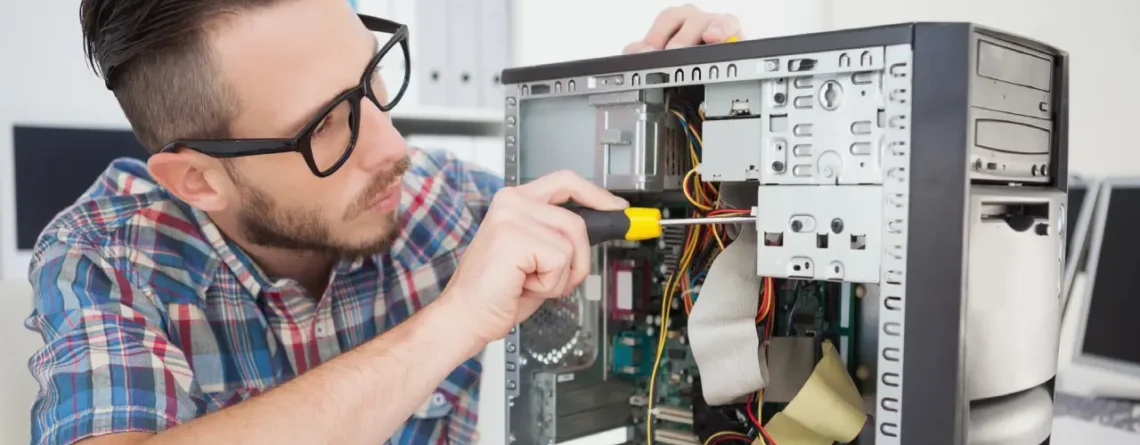Expert Computer Repair Canberra: Solving All Your Issues
Computers are integral to our daily lives, whether for work, education, communication, or entertainment. However, these complex machines can encounter various issues that affect their performance and functionality. In this article, we’ll delve into common computer repair issues, showcase the top repair services available in Canberra, highlight the benefits of choosing expert repair services, and provide tips for maintaining your computer.
Common Computer Repair Issues
Hardware Failures
Hard Drive Crashes
A failing hard drive can lead to significant data loss and system instability. Warning signs of a failing hard drive include unusual noises, frequent system crashes, and slow performance. When a hard drive begins to fail, it may emit clicking or grinding sounds, indicating mechanical issues. Frequent system crashes and slow performance can also be indicative of bad sectors on the drive or other internal faults.
Solution: If you suspect your hard drive is failing, it’s crucial to back up your data immediately. You can use data recovery software to attempt to retrieve lost files, but for more severe cases, professional data recovery services might be necessary. Replacing the failing hard drive with a new one and restoring your data from backups can prevent further loss and system instability.
RAM Issues
Faulty RAM can cause random reboots, crashes, and sluggish performance, severely affecting your computer’s efficiency. RAM problems can manifest as frequent blue screens of death (BSOD) on Windows systems, unexpected system restarts, or applications failing to load properly.
Solution: To diagnose RAM issues, you can use built-in tools like the Windows Memory Diagnostic or third-party software like MemTest86. If the tests reveal faulty RAM, replacing the malfunctioning modules with new, compatible ones will resolve the issue and improve system stability and performance.
Motherboard Problems
A damaged motherboard can lead to various issues, including failure to boot, hardware malfunctions, and system crashes. Signs of motherboard problems include the computer not turning on, random shutdowns, or components like the CPU, RAM, and peripheral devices not being recognized.
Solution: Diagnosing motherboard issues can be complex and often requires a professional technician. If the motherboard is damaged, it may need to be replaced. Ensure that the replacement motherboard is compatible with your existing components to avoid further issues.
Software Issues
Operating System Errors
Corrupted or outdated operating systems can cause slow performance, crashes, and other malfunctions. Symptoms of operating system errors include slow startup times, unresponsive applications, and frequent error messages.
Solution: Regular updates and repairs are essential to maintaining a healthy operating system. Ensure your OS is up to date with the latest patches and updates. For severe issues, performing a system restore or reinstalling the operating system may be necessary to resolve the problems.
Virus and Malware Infections
Malicious programs like viruses and malware can compromise your data, slow down your system, and cause erratic behavior. Common signs of infections include unexpected pop-up ads, slow performance, and unauthorized changes to system settings.
Solution: Use effective antivirus software and malware removal tools to scan and clean your system regularly. Ensure your security software is up to date to protect against the latest threats. Practicing safe browsing habits and being cautious with email attachments can also help prevent infections.
Connectivity Issues
Wi-Fi Problems
Difficulty connecting to Wi-Fi networks or frequent disconnections can be frustrating and limit your ability to work or browse online. Wi-Fi issues can stem from problems with the router, network settings, or the computer’s Wi-Fi adapter.
Solution: Start by restarting your router and computer. Check for firmware updates for your router and update your Wi-Fi drivers. If issues persist, resetting your network settings or contacting your Internet Service Provider (ISP) for further assistance may help resolve the problem.
Peripheral Connection Problems
Issues with USB ports, printers, or other peripheral devices can hinder productivity and lead to frustration. Symptoms include devices not being recognized, intermittent connectivity, or complete failure to function.
Solution: Ensure that your peripheral devices are properly connected and that the necessary drivers are installed. Try connecting the devices to different ports or using them on another computer to rule out hardware issues. Updating or reinstalling drivers can also resolve many connectivity problems.
Performance Issues
Slow Performance
Over time, computers can become sluggish due to accumulated files, outdated software, or insufficient hardware. Symptoms include slow startup times, lagging applications, and general unresponsiveness.
Solution: Regular maintenance, such as cleaning up temporary files, defragmenting the hard drive, and uninstalling unnecessary applications, can improve speed and performance. Upgrading hardware components like adding more RAM or switching to an SSD can also provide a significant boost in performance.
Overheating
Poor ventilation, dust buildup, or failing fans can cause your computer to overheat, leading to shutdowns and potential hardware damage. Signs of overheating include the system feeling hot to the touch, loud fan noise, and unexpected shutdowns.
Solution: Ensure that your computer has adequate ventilation and is not placed in confined spaces. Regularly clean the interior components to remove dust buildup and check that all fans are functioning correctly. Using a cooling pad for laptops or adding additional fans for desktops can help manage temperatures effectively.
Data Loss
Accidental Deletion
Important files can be accidentally deleted, leading to data loss and potential work disruptions. This can occur due to human error, software glitches, or issues with the storage device.
Solution: Data recovery services can help retrieve lost information. If you realize you’ve deleted a file accidentally, stop using the affected storage device to avoid overwriting the data. Use data recovery software or consult a professional data recovery service to attempt file recovery. Regular backups are essential to prevent data loss and ensure that important information is always recoverable.
Top Repair Services for Computers in Canberra
Canberra offers a variety of professional computer repair services to address a wide range of issues. Here are some of the top services available:
1. Hardware Repairs and Replacements
Expert technicians in Canberra can diagnose and replace faulty components, including hard drives, RAM, motherboards, power supplies, and more. Whether your computer is experiencing random crashes, slow performance, or complete failure to boot, professional repair services can identify the problematic hardware and replace it with high-quality parts, ensuring your computer runs smoothly and reliably.
2. Software Troubleshooting and Updates
Software issues can significantly affect a computer’s performance and functionality. Professionals can resolve operating system errors, update software, and optimize your system’s performance to prevent crashes and slowdowns. This includes diagnosing and fixing problems with system files, removing software conflicts, and ensuring that all applications are up to date and running efficiently.
3. Virus and Malware Removal
Viruses and malware can compromise your data, slow down your computer, and cause various other issues. Comprehensive virus and malware removal services in Canberra ensure your computer is free from harmful programs. Technicians use advanced tools to detect and remove viruses, spyware, adware, and other malicious software, protecting your personal information and restoring your computer’s performance.
4. Data Recovery
Accidentally deleted important files or experienced a hard drive failure? Specialized data recovery services can retrieve lost or deleted files, ensuring your important data is not permanently lost. Using sophisticated recovery techniques, technicians can recover data from damaged hard drives, SSDs, and other storage devices, providing you with access to critical documents, photos, and other files.
5. Wi-Fi and Connectivity Solutions
Connectivity issues can be frustrating and disruptive. Technicians in Canberra can diagnose and fix Wi-Fi and peripheral connection problems, ensuring seamless connectivity for your devices. Whether you’re dealing with poor Wi-Fi reception, frequent disconnections, or issues connecting peripherals like printers and external drives, professional services can optimize your network and ensure stable connections.
6. Performance Optimization
Over time, computers can become sluggish due to accumulated files, outdated hardware, and other factors. Performance optimization services, such as system cleaning, hardware upgrades, and thermal management, can significantly improve your computer’s speed and efficiency. Technicians can clean out dust and debris, upgrade components like RAM and storage, and optimize cooling systems to prevent overheating and maintain peak performance.
7. Custom Builds and Upgrades
For users needing more power or specific features, custom computer builds and upgrades provide tailored solutions to meet unique requirements. Whether you need a high-performance gaming PC, a powerful workstation for video editing, or a specialized computer for other professional needs, technicians can design and build custom systems with the latest components and technologies. Upgrades to existing systems can also be performed to enhance performance and extend the life of your current computer.
Benefits of Fast and Reliable Computer Repair Services
Opting for expert computer repair services in Canberra comes with a host of advantages, ensuring your device remains in optimal condition while providing you with peace of mind and convenience.
1. Minimized Downtime
Quick and efficient repairs are crucial for minimizing downtime, allowing you to get back to work or play without prolonged interruptions. Expert technicians understand the importance of your computer in your daily life and strive to provide timely solutions. By choosing a professional service, you ensure that your computer issues are resolved swiftly, reducing the time you spend without your essential device.
2. Cost-Effective Solutions
Repairing your existing computer is often more affordable than purchasing a new one. Expert repairs can extend the life of your device and provide better value for your money. Many common issues, such as hardware failures or software glitches, can be resolved without the need for a costly replacement. By investing in professional repairs, you can save significant amounts of money while still enjoying a fully functional computer.
3. Professional Diagnosis and Repair
Skilled technicians have the knowledge and tools to accurately diagnose and fix issues, ensuring long-term solutions rather than temporary fixes. They can identify underlying problems that might not be apparent to the average user, providing thorough and effective repairs. This expertise guarantees that the root cause of your computer troubles is addressed, preventing recurring issues and enhancing the overall reliability of your device.
4. Quality Parts and Service
Reputable repair services use high-quality parts and offer warranties, providing peace of mind and reliable performance. When your computer is repaired with top-notch components, you can trust that it will function optimally for a long time. Additionally, the warranties offered by professional services mean that if any issues arise after the repair, you are covered. This assurance of quality and reliability is a significant benefit of choosing expert repair services.
5. Data Security
Professional repair services prioritize data security, ensuring your sensitive information is protected during the repair process. Skilled technicians follow strict protocols to safeguard your data, preventing unauthorized access or loss. This is particularly important for personal and business users who store critical information on their computers. By entrusting your device to a reputable repair service, you can be confident that your data remains secure.
6. Convenience
Many repair services offer on-site repairs, remote support, or quick turnaround times, making it convenient to get your computer fixed. On-site repairs allow technicians to come to your home or office, saving you the hassle of transporting your device. Remote support enables technicians to diagnose and resolve issues over the internet, often solving problems without the need for a physical visit. Quick turnaround times ensure that even if you take your computer to a repair shop, you won’t be without it for long. These convenient options make professional repair services an attractive choice for busy individuals and businesses.
Tips for Maintaining Your Computer
Maintaining your computer properly can prevent common issues and ensure it performs at its best. Here are some essential tips to help you keep your computer running smoothly:
1. Regular Software Updates
Keeping your operating system, antivirus software, and applications updated is crucial for optimal performance and security. Software updates often include patches for security vulnerabilities, performance improvements, and new features that enhance your computing experience. Regular updates ensure that your system is protected against the latest threats and runs efficiently.
2. Clean Your Computer
Regularly cleaning your computer’s exterior and interior prevents dust buildup, which can cause overheating and hardware failures. Dust can clog fans and vents, leading to poor ventilation and increased temperatures inside your computer. Use compressed air to clean out dust from the vents, fans, and other components. Wipe down the exterior with a soft, lint-free cloth to keep it free from dirt and grime.
3. Manage Your Storage
Organizing and regularly deleting unnecessary files helps free up space on your computer, improving its speed and performance. Use external or cloud storage for important data to reduce the burden on your internal storage. Regularly clean out temporary files, caches, and other junk data that can accumulate over time. Keeping your storage organized also makes it easier to find and manage your files.
4. Monitor Performance
Using built-in tools or third-party software to monitor your computer’s performance can help you identify potential issues before they become serious problems. Tools like Task Manager on Windows or Activity Monitor on macOS provide insights into CPU, memory, and disk usage. Monitoring software can alert you to unusual activity or resource usage, allowing you to take action to prevent slowdowns or crashes.
5. Secure Your System
Securing your system is vital to protect your computer from malware and unauthorized access. Enable strong passwords and use antivirus software to safeguard your data. Be cautious of suspicious emails, downloads, and websites that may contain malware. Regularly update your security software and perform system scans to detect and remove any threats. Consider enabling two-factor authentication for an added layer of security.
6. Optimize Startup Programs
Limiting the number of programs that start automatically with your computer can improve boot times and overall performance. Many applications set themselves to launch at startup, which can slow down your computer. Use the startup manager in your operating system to disable unnecessary programs from starting automatically. This will help your computer boot faster and reduce the load on your system resources.
7. Regular Backups
Regularly backing up your important data to external drives or cloud services is essential to prevent data loss in case of hardware failure or other issues. Set up automatic backups to ensure your files are always up to date and protected. In the event of a system crash, malware attack, or accidental deletion, having a recent backup can save you from significant data loss and downtime.
8. Proper Ventilation
Ensuring your computer has adequate ventilation is crucial to prevent overheating. Avoid placing your computer in confined spaces, and keep it away from heat sources. Make sure that the air vents are unobstructed and that there is enough space around the computer for air to circulate. For desktops, consider using additional cooling solutions like extra fans or liquid cooling systems to maintain optimal temperatures.
Conclusion: Expert Services for All Your Computer Repair Needs
Computers are essential tools that require regular maintenance and prompt repairs to ensure optimal performance. In Canberra, expert computer repair services offer fast, reliable, and cost-effective solutions for all your computer issues. From hardware repairs and software troubleshooting to virus removal and data recovery, professional technicians provide comprehensive services to keep your computer running smoothly.
By choosing expert repair services, you benefit from minimized downtime, professional diagnosis and repair, quality parts, data security, and convenience. Additionally, following maintenance tips can help extend the life of your computer and prevent common problems.
For all your computer repair needs in Canberra, trust the skilled technicians at tech-box.com.au to provide top-notch service and ensure that your device remains in excellent working condition. Contact us today for a free consultation and experience the best in computer repair services.










